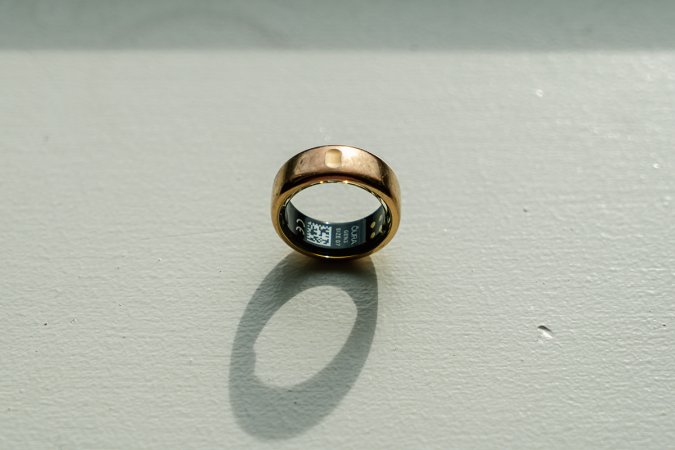We may earn revenue from the products available on this page and participate in affiliate programs. Learn more ›
In the ever-expanding world of devices, our attention is turning to smart rings, an increasingly popular option for those looking for an all-day (and night) wearable. While smartwatches have typically ruled the wearable roost, rings have a generally lower profile and might be considered a more discreet, versatile accessory. Like our best overall pick, the Oura Ring, most smart rings feature a long-lasting battery, detailed health and fitness tracking, and sleep stats. The world of smart rings is still pretty new, which means only a few models are up to snuff. The best smart rings will provide similar benefits to a clunkier smartwatch with a stylish bent and comfortable fit.
How we chose the best smart rings
As a longtime smartwatch and fitness tracker wearer, I’ve been extremely curious about smart rings ever since the original Oura Ring hit the market. As a technology commitment-phobe, I’ve delayed my purchase for a while, never settling on the right model for me. I began my research by tallying up the most popular models, scouring r/smartrings for inside information, and consulting various peers who have been wearing one smart ring or another. I looked at battery life, companion apps, available health stats, reported accuracy, overall aesthetic design, and device compatibility. Needless to say, I am invested in finding the best smart ring for me and you. Smart rings are still a relatively new addition to the line-up of everyday tech gadgets, so we will continue to update this article as more models are released.
The best smart rings: Reviews & Recommendations
Smart rings are primarily designed to help you keep track of your health. They don’t have screens, so you won’t see any text messages or calendar alerts pop up on your finger. This means finding the right smart ring for you depends on what information takes priority regarding your sleep, heart rate, hormonal cycle, etc.
Best overall: Oura Ring
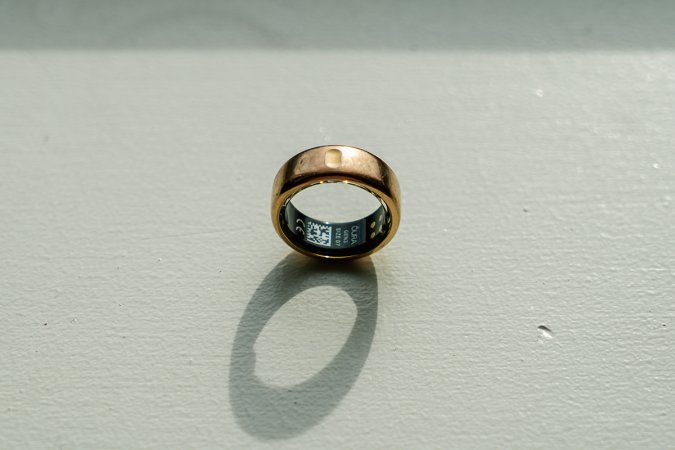
The Oura Ring is a fashionable take on a health tracker. We wore it for most of eight months to find out if it prioritizes style over substance.
See It
Why it made the cut: The Oura Ring is one of the original, publically available rings and is an extremely well-rounded model with a host of sensors and stellar sleep-tracking.
Specs
- Battery life: Up to 7 days
- Dimensions: Width 7.90mm / Thickness 2.7-2.9mm
- Device Compatibility: iOS and Android
- Sizes: 6-13
- IP rating: IPX8
Pros
- Excellent battery
- Easy-to-use, dynamic app
- Automatic workout detection
Cons
- Monthly subscription fee
- Can get scratched with intense activities
- No portable charging case
Is there truly one ring to rule them all? Quite possibly. The Oura Ring first debuted in 2015 via Kickstarter and has continued to claim the crown when it comes to the best smart ring.
The Oura Ring has been around longer than its competitors, meaning its design is more refined, its data collection is more developed, and its app is more navigable. Many users report accurate data collection (over other models) with sensors tracking your heart rate, blood oxygen, movement, and body temperature. The Oura Ring also has automatic workout detection that works, a huge win over most other smart rings. It can pick up on activities like cycling, hiking, and even log housework that raises your heart rate. While this data isn’t always the most accurate, it does exist, which is more than other rings can claim. From this data, Oura will generate an Activity score, tracking active calorie burn, baseline heart rate, and more to spit out a number that will let you know if you need a better balance “between movement and recovery.”
Sleep tracking is solid, too; the Oura Ring tracks your sleep stages, movement, blood oxygen, and skin temperature throughout the night. In the morning, you’ll get a Sleep Score that will be used to inch you closer to getting a full night’s rest every night.
You’ll also get a Readiness Score every morning, which compiles all your data from the previous day and night to let you know how prepared your body is to take on the day ahead. Other data include Illness Detection, Daytime Stress, Resilience (supposedly telling you how well your body recovers from physiological stress), and Cycle Tracking. Oura has partnered with Natural Cycles to help you track your menstrual cycle, ovulation, and predict periods. Natural Cycles is the first FDA-cleared birth control app. Unfortunately, you must pay a $5.99 subscription fee to access many of the features that make the Oura Ring stand out.
The Oura Ring has been around for almost 10 years and is still the standout amongst smart rings (a fact one of our reviewers supports in her extensive hands-on). The ring’s fourth generation became available on October 3, bringing about even better battery life, extended sizes, improved sensor accuracy, and a new charging base. While we haven’t gotten our hands on it yet, if it’s anything like the third generation, we are confident it isn’t relinquishing its title. The 4th generation model seems like the only model available on the site, but if you do a little digging, you can still find a 3rd generation model at a cheaper price.
Best for fitness: Ultrahuman Ring Air

Ultrahuman
See It
Why it made the cut: The Ultrahuman Ring Air is a solid runner-up with a host of health-tracking features, an informative recovery score, and a lightweight build.
Specs
- Battery life: Up to 6 days
- Dimensions: Width 8.1mm / Thickness 2.45-2.8mm
- Device Compatibility: iOS and Android
- Sizes: 5 to 14
- IP Rating: IPX8
Pros
- No subscription fee
- For men: a more masculine look
- Dynamic recovery tracking
Cons
- Expensive
- Battery life is good, not great
- No automatic workout detection
The Ultrahuman Ring Air is a lightweight titanium ring that gives the Oura a run for its money (literally because it doesn’t charge a subscription fee). The ring is equipped with a PPG sensor, skin temperature sensor, motion sensor, heart rate, and blood oxygen tracking via LED lights. The companion app will show you scores for sleep, movement, and recovery. Your movement score is related to steps and exercise. It will estimate your blood oxygen and cardiovascular fitness based on the data it gathers. Like a FitBit (or similar wearable), this ring will nudge you throughout the day to take a few steps if you’ve been chained to a desk for hours.
Sleep tracking is one of the ring’s most successful features, tracking sleep stages (light, deep, REM, and awake), heart rate variability, and skin temperature. Your recovery score will be based on the previous day’s sleep and movement score; it tells you how well you’ve prepared your body to take on the day ahead (similar to the Oura’s Readiness Score). You’ll also get a weekly report instructing you on areas to improve. The Ring Air will make suggestions throughout the week to help improve your sleep and overall health, i.e., stop drinking coffee towards the end of the day, etc.
There are a ton of benefits to the Ring Air, but nothing is perfect. While the Ring Air does a solid job tracking health stats, it is not a dedicated fitness tracker, so you’ll need to log your workouts manually. Secondly, Ultrahuman says the battery lasts for up to six days, but many users experience a 4-5-hour battery with constant wear. There isn’t a baseline subscription price, but if you want to add select features (called Power Plugs), that’ll be an extra $4.90; this includes AFib detection.
Overall, the Ultrahuman Ring Air is great for those who want detailed health tracking and care less about workout tracking. Of course, you can always opt to pair a ring with a fitness tracker for maximum health stats.
Best for Samsung devices: Samsung Galaxy Ring
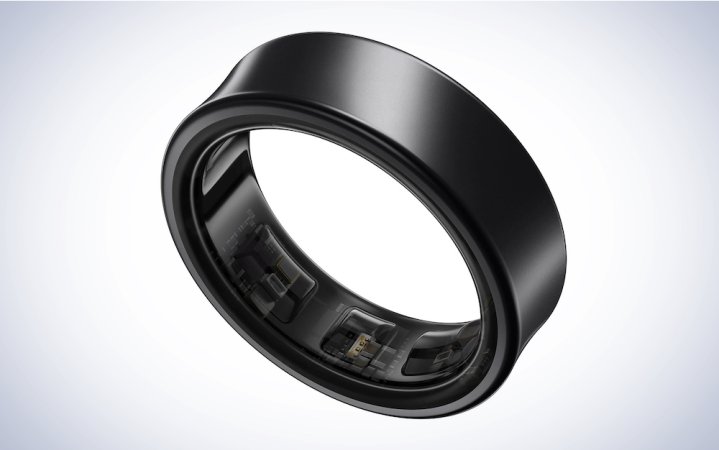
Samsung
See It
Why it made the cut: The new Samsung Galaxy Ring is a great option for any Galaxy Watch or Galaxy Phone users, thanks to a host of special features.
Specs
- Battery life: Up to 7 days
- Dimensions: Width 7mm // Thickness 2.6mm
- Device Compatibility: Android
- Sizes: 5 to 13
- IP rating: IP68
Pros
- Slim design
- Auto-detects workouts
- Cycle-tracking via Natural Cycles
- Double Pinch
- Battery sharing
Cons
- Pricey
- Relies on Galaxy Watch or Samsung phone to access features
The Samsung Galaxy Ring is one of the newest smart rings on the market, released in July 2024. It’s the ring to get if you have a Samsung phone and/or Galaxy Watch because many of the features are supported by Galaxy AI. It has no iOS compatibility, and you’ll miss out on most features without a Samsung Galaxy device. It is compatible with Android devices but is best integrated with Samsung products. For example, when added to Samsung’s Health app, it will unite with your Galaxy watch or phone. From there, you can send battery-draining tasks to either device, thereby saving battery on the other. You can also use Double Pinch to silence your phone alarm with a wave (or pinch) of your finger.
The titanium ring is lightweight, and the design is minimalistic, with a photoplethysmogram (PPG) sensor and three LEDs to track blood volume. It also includes a skin temperature sensor and accelerometer. On the ring’s app, you can take your Energy Score (generated by Galaxy AI) which essentially summarizes your stats from the previous 24 hours to give you a number describing how ready you are to begin your day. You can also get detailed sleep and activity reports. The ring can auto-detect workout types, which is rare for a smart ring, and it is equipped with menstrual cycle tracking features powered by Natural Cycles and based on skin temperature and surrounding temps. It’s a splurge at $399, but it’s a great smart ring for anyone with a Samsung Galaxy device.
Best for women: Evie Smart Ring
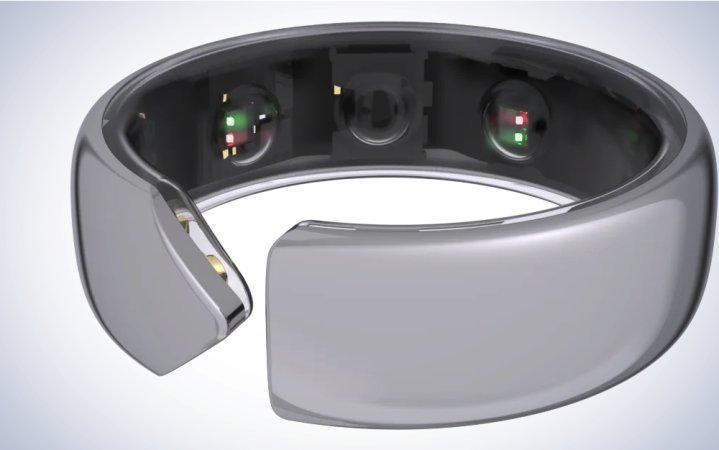
Evie
See It
Why it made the cut: The Evie Smart Ring is arguably the best-looking ring of the bunch, especially for those who want to forget they are wearing a smart device.
Specs
- Battery life: Roughly four days
- Dimensions: Width 8mm // Thickness 3mm
- Device Compatibility: iOS 16 or above
- Sizes: 5 to 12
- IP rating: IP22
Pros
- Unique gap design
- Blood-oxygen sensor
- More affordable than other models
- Travel charging case
Cons
- No Android compatibility
- Battery life
- App lacks finesse
- Water resistance is lacking
The Evie Smart Ring was created by Movano Health, a medical health tech company, and designed specifically for women. It incorporates sex-specific biometrics and includes features like period/cycle tracking (the app also uses a lot of pink). Monovao does acknowledge the lack of representation for non-binary and genderqueer individuals across their biometric studies and does not outline whether or not they would suggest their ring for said individuals. While cycle tracking is certainly an important aspect of many lives, the Evie hasn’t actually cornered the market on this feature; other rings function similarly, and many smartwatch models can detect cycle fluctuations. Evie has, however, applied for FDA approval. The Evie ring’s sensors include skin temperature, heart rate, and an accelerometer that tracks steps, activity intensity, sleep quality, and more. You can also use the app to manually log activities and set personal goals.
The Evie Ring has the most unique design, and many users report a very comfortable fit. It also comes with a portable charging case that holds up to 10 additional charges (the ring can last up to four days on a single charge). If you want a stylish ring that will blend in with your other jewelry for a fairly affordable price, the Evie Ring might be the one for you.
Best value: RingConn Smart Ring
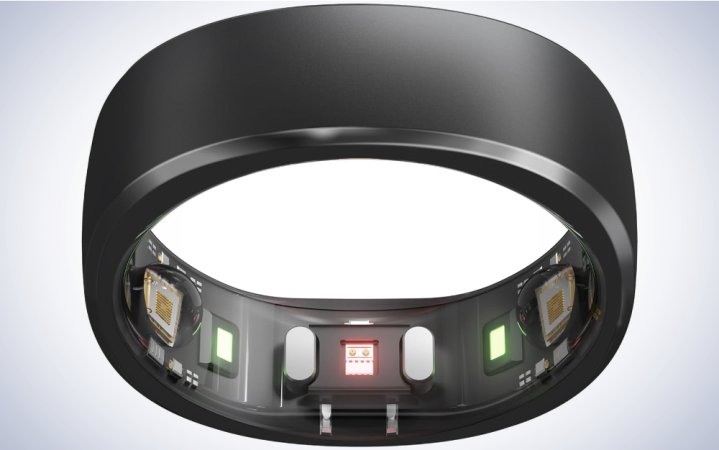
RingConn
See It
Why it made the cut: The RingConn Smart Ring has most of the features we are looking for at a price that’s relatively more affordable than its competitors.
Specs
- Battery life: Roughly 7 days
- Dimensions: Width 7.8mm // Thickness 2.6mm
- Device Compatibility: iOS and Android
- Sizes: 6 to 14
- Water-resistance: IP68
Pros
- Price
- Can sync with Google Fit and Apple Health
- Solid battery life
Cons
- Chunky design
- Data syncing can be finicky
- No cycle tracking
- Connectivity range is limited
The RingConn Smart Ring is a great smart ring overall and certainly delivers the best bang for your buck. It sports many of the same features found in the Oura model, including sleep tracking, SPO2, and heart rate monitoring. While it doesn’t come with every bell and whistle, it provides well-rounded data collection that will keep you informed about your daily health. For example, the ring can record your “activity intensity,” but it’s not going to be able to guess what type of workout you’re doing (running, swimming, etc). You can, however, manually record workouts and the ring will sync to Google Fit and Apple Health, though the sync time can be slow.
The RingConn app is fairly easy to navigate, displaying your vital signs, stress level, and sleep stats on the home page. Each category has its own tab if you’d like to dive deeper into the details. You’ll also see a Health Timeline that alerts you to your wake time, any stress spikes, and goals met throughout the day. The app will let you customize these goals, including sleep hours, steps, and caloric burn. The RingConn Smart Ring reports up to seven days of battery with a 90-minute charge time from the convenient charging case.
The RingConn Gen 1 is currently for $259, likely because the RingConn Gen 2 is available for preorder.
What to consider when buying the best smart rings
There are many factors to consider when deciding which smart ring is right for you. Below are the factors we considered most important when writing this guide.
Privacy
Always read the fine print on any smart ring or watch. These devices can track sensitive, private medical information, which is, of course, beneficial to the wearer, but, like any smart product, they may come with data-sharing details in the fine print. Of course, online menstrual cycle tracking has specifically become a topic of great debate and it’s important to consider personal safety when tracking and sharing any personal information. Always exercise caution and read the terms and agreements before using any smart wearable to ensure you know what companies are doing with your data.
FAQs
You can generally wear a smart ring on whichever finger you choose; however, certain companies will have more specific recommendations. For example, Samsung suggests wearing their ring on your index finger while Ultrahuman works on the index, middle, and ring finger. Generally speaking, your thumb and pinky fingers won’t work with a smart ring. Most companies will also offer a sizing kit that gets sent to your home so you can ensure you’ll get the right size for whichever finger you choose.
The disadvantages of smart rings really come down to personal preference when it comes to techy wearables. If you want to make the switch from watch to ring, you’ll need to sacrifice notification displays and likely tracking features like GPS. Smart rings are generally more expensive than smartwatches and they don’t always have accurate stats. If you are specifically looking for a fitness tracker, smart rings might leave you wanting more. Finally, smart rings are newer, so many companies are still ironing out the bumps in their firmware.
The Vitality Blood Pressure Smart Ring claims to accurately report blood pressure. There are also two rings yet to be released that purport BPM support: The Ring One and Velia Ring. Keep in mind that smart rings are not medical devices and should be used in conjunction with doctor-recommended monitors.
Final thoughts on the best smart rings
The best smart rings stay on top of their game when recording accurate, actionable results. The Oura Ring is still the champion, but many other models are coming up right behind. To reap the rewards of a smart ring, make sure you pick a ring that fits, that you can comfortably wear to bed, with an app you don’t mind digging into every day. You’ll also want to consider price, design, and durability. Remember, smart rings aren’t specifically fitness trackers and generally don’t perform as well when it comes to activity tracking, but if you’re looking for something that will keep you informed regarding heart rate, sleep, and general movement, a smart ring might be the best wearable for you.

